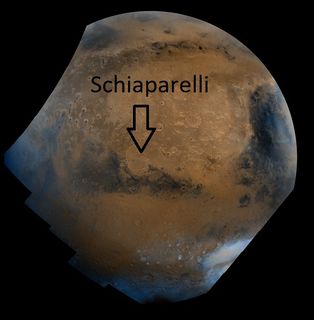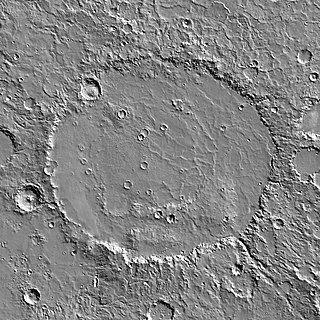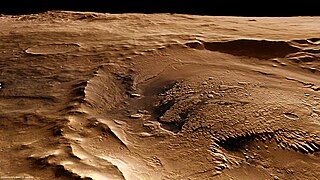Difference between revisions of "Schiaparelli Crater"
| Line 1: | Line 1: | ||
{{Mars atlas}} | {{Mars atlas}} | ||
| − | + | __NOTOC__ | |
| − | |||
| − | + | Schiaparelli is an impact crater, located near the planet's equator at latitude 3° south and longitude 344° in the [[Sinus Sabaeus quadrangle]]. Since it is fairly large and sits on the equator it is a good feature to find as it tells you about where the equator is located. Just to its East is a large darks spot, Syrtis Major which is also easy to find. Schiaparelli measures approximately 459 kilometers in diameter and was named after Italian astronomer Giovanni Schiaparelli, known for his observations of the Red Planet and his mistranslated term "canali". The name was adopted by IAU's Working Group for Planetary System Nomenclature in 1973.<ref>"Gazetteer of Planetary Nomenclature – Schiaparelli". usgs.gov. Working Group for Planetary System Nomenclature – International Astronomical Union</ref><gallery widths="320" heights="320"> | |
| − | + | File:Schiaparelli Hemisphere - PIA00004labeled.jpg|Schiaparelli Hemisphere | |
| − | [[File:Schiaparelli Hemisphere - PIA00004labeled.jpg| | + | File:Schiaparelli crater by Viking orbiter.jpg|Schiaparelli crater by Viking orbiter |
| + | File:Schiaparelli Martian crater 650km.jpg|General view | ||
| + | File:Schiaparelli in perspective ESA233851.jpg|Schiaparelli in Perspective, ESA | ||
| + | File:SchiaparelliMOLA.jpeg|MOLA image of Schiaparelli | ||
| + | </gallery> | ||
Schiaparelli Crater The dark area to the right is Syrtis Major. | Schiaparelli Crater The dark area to the right is Syrtis Major. | ||
| Line 11: | Line 14: | ||
Some places within Schiaparelli show many layers that may have formed by the wind, volcanoes, or deposition under water. Some are quite beautiful as shown in the pictures above and below. People often seek to travel to our national parks like the Grand Canyon to see layers like the ones in Schiaparelli. | Some places within Schiaparelli show many layers that may have formed by the wind, volcanoes, or deposition under water. Some are quite beautiful as shown in the pictures above and below. People often seek to travel to our national parks like the Grand Canyon to see layers like the ones in Schiaparelli. | ||
| − | |||
| − | |||
Topo map of Schiaparelli Crater, as seen by the Mars Orbital Laser Altimeter (aboard the Mars Global Surveyor) | Topo map of Schiaparelli Crater, as seen by the Mars Orbital Laser Altimeter (aboard the Mars Global Surveyor) | ||
| − | <gallery class="center" widths=" | + | <gallery class="center" widths="380" heights="240"> |
| − | + | File:ESP 046814 1785schiaparellimola.jpg|MOLA map of area around Schiaparelli Crater | |
| − | ESP 046814 1785schiaparellimola.jpg|MOLA map of area around Schiaparelli Crater | + | File:ESP 028511rings.jpg|Circular structures on floor of Schiaparelli Crater |
| − | + | File:46814 1785layeredmound.jpg|Layered mound in Schiaparelli Crater | |
| − | + | File:46814 1785layeredmound2.jpg|Layers in Schiaparelli Crater | |
| − | + | File:46814 1785layeresleft.jpg|Layers in Schiaparelli Crater | |
| − | + | File:46814 1785layerscloseleftbottom.jpg|Close view of layers in Schiaparelli Crater, as seen by HiRISE under [[HiWish]] Dark sand is visible on some layers. | |
| − | + | File:ESP 046814 1785layersclosecolor.jpg|Close, color view of layers in Schiaparelli Crater Dark sand is visible on some layers. | |
| − | 46814 1785layeredmound.jpg|Layered mound in Schiaparelli Crater | ||
| − | |||
| − | File: 46814 1785layeredmound2.jpg|Layers in Schiaparelli Crater | ||
| − | |||
| − | 46814 1785layeresleft.jpg|Layers in Schiaparelli Crater | ||
| − | |||
| − | |||
| − | 46814 1785layerscloseleftbottom.jpg|Close view of layers in Schiaparelli Crater, as seen by HiRISE under [[HiWish]] Dark sand is visible on some layers. | ||
| − | |||
| − | ESP 046814 1785layersclosecolor.jpg|Close, color view of layers in Schiaparelli Crater Dark sand is visible on some layers. | ||
| − | |||
| − | |||
| − | |||
| − | |||
| − | |||
| − | |||
File:54554 1785layersclose.jpg|Close view of layers and rough terrain in Northwestern Schiaparelli Crater | File:54554 1785layersclose.jpg|Close view of layers and rough terrain in Northwestern Schiaparelli Crater | ||
| − | |||
| − | |||
</gallery> | </gallery> | ||
Revision as of 08:57, 21 April 2020
Schiaparelli is an impact crater, located near the planet's equator at latitude 3° south and longitude 344° in the Sinus Sabaeus quadrangle. Since it is fairly large and sits on the equator it is a good feature to find as it tells you about where the equator is located. Just to its East is a large darks spot, Syrtis Major which is also easy to find. Schiaparelli measures approximately 459 kilometers in diameter and was named after Italian astronomer Giovanni Schiaparelli, known for his observations of the Red Planet and his mistranslated term "canali". The name was adopted by IAU's Working Group for Planetary System Nomenclature in 1973.[1]
Schiaparelli Crater The dark area to the right is Syrtis Major.
Some places within Schiaparelli show many layers that may have formed by the wind, volcanoes, or deposition under water. Some are quite beautiful as shown in the pictures above and below. People often seek to travel to our national parks like the Grand Canyon to see layers like the ones in Schiaparelli.
Topo map of Schiaparelli Crater, as seen by the Mars Orbital Laser Altimeter (aboard the Mars Global Surveyor)
Close view of layers in Schiaparelli Crater, as seen by HiRISE under HiWish Dark sand is visible on some layers.
Layers in crater found within the Schiaparelli Crater basin as seen by Mars Global Surveyor
The Martian
Schiaparelli Crater was featured in the 2011 novel "The Martian" by Andy Weir, and in the popular movie of the same name in 2015. In the story, Schiaparelli Crater is the landing site for Ares 4, the fourth manned mission to Mars. Mark Watney, an astronaut from Ares 3 who is stranded on Mars, must travel from Acidalia Planitia to Schiaparelli, a journey of 3200km.[2]
References
- ↑ "Gazetteer of Planetary Nomenclature – Schiaparelli". usgs.gov. Working Group for Planetary System Nomenclature – International Astronomical Union
- ↑ Weir|first=Andy|title=The Martian (Andy Weir)|The Martian|year=2014|location=New York City|New York|publisher=Crown Publishers|isbn=978-0-8041-3902-1
See Also




















